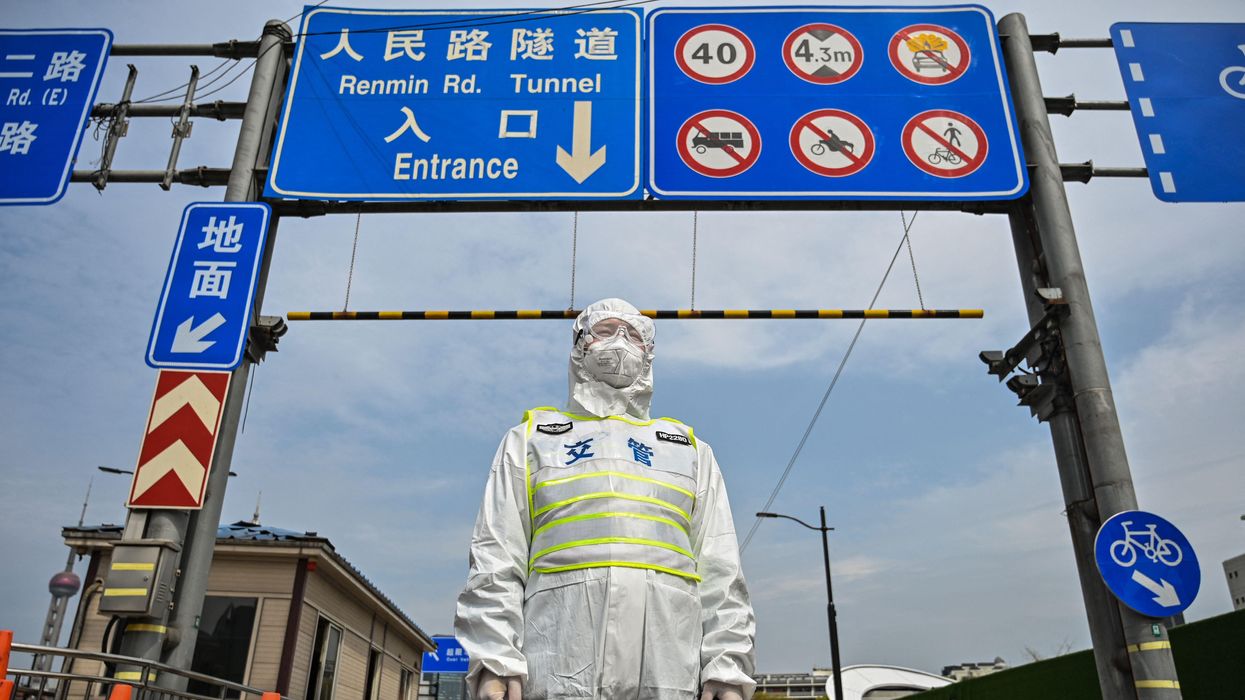
Photo by HECTOR RETAMAL/AFP via Getty Images

In mid-March, China reimposed COVID-19 restrictions on two of its largest cities — Shenzhen and Shanghai — in response to growing case numbers of the Omicron and Delta variants in the country.
At the time, city officials stopped short of ordering a full-fledged lockdown by restricting intercity bus services and barred citizens from leaving either Shenzhen or Shanghai unless it was “deemed necessary,” and persons seeking to travel presented a negative PCR test to local government emissaries.
Towards the end of March, Shanghai, a crucial financial and economic hub in China and the country’s largest city, began a phased COVID-19 lockdown. The Chinese government opted not to implement a full citywide lockdown of Shanghai fearing the potential damage doing so could cost the Chinese economy.
The phased lockdown strategy separated the city’s eastern and western halves using the Huangpu River as a divider. The eastern half was to undergo lockdown protocols during the last days of March and the western half would undergo the same protocol starting on April 1.
Since March 1, the Wallstreet Journal reported, the city of Shanghai has reported more than 130,000 cases of COVID-19 and zero deaths.
However, considering China’s dedication to lying to the world about its covid numbers, it is difficult to even estimate how many covid deaths the country has racked up.
Sean Sylvia, an assistant professor of healthy policy at the University of North Carolina at Chapel Hill, said, “We just don’t know what the true number of deaths is. That is true globally, too. We have estimates. But in a lot of places, it’s very uncertain, and China’s one of those places.”
Despite three elderly-care facilities in Shanghai grappling with the cities ongoing covid outbreak in which 20 patients have died in recent weeks, the city continues to report zero deaths from COVID-19.
Wu Zunyou, the chief medical expert at the Chinese Center for Disease Control and Prevention, said that China has been able to keep death rates low because of “its efforts to detect and curb outbreaks at an early stage, its high vaccination rate and an approach of treating all infected patients.” The Wallstreet Journal reported that Wu said that this approach has “helped prevent mild cases from turning into severe ones.”
China’s approach since the outset of the COVID-19 pandemic was to control the virus’s spread through its aggressive “zero-COVID policy.”
The Chinese government’s aggressive approach has led to officials issuing warnings to residents of Shanghai about what they are saying online regarding lockdown conditions and the food shortages that have arisen as a result.
This is what the CCP is doing to the 26 million people of Shanghai \n\nDo not look awaypic.twitter.com/yjA2Sj4khz— Jack Posobiec \ud83c\uddfa\ud83c\uddf8 (@Jack Posobiec \ud83c\uddfa\ud83c\uddf8) 1649527875
The Financial Times reported that the food orders of Shanghai residents are being canceled because delivery drivers and suppliers cannot meet demand.
Fan, a woman in her 30s, has been in a quarantine facility for almost a week and has only been given folk remedies for medicine.
She said, “The staff have had to deal with all kinds of things from the occasional fight [among patients] and water running low.”
A senior executive at a private equity firm in Shanghai said, “It doesn’t matter how much money you have or are willing to spend, you can’t get steady access to food.”